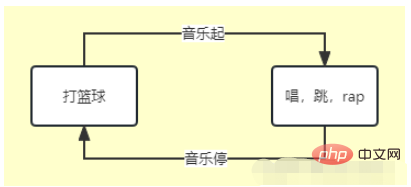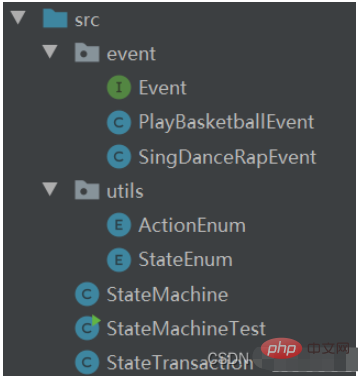How to implement Java state machine
Suppose we have two states

This state transition is very simple, let’s try to implement it in java
The program structure is as shown below

Let’s first introduce the representation of status
public class StateTransaction {
// 当前状态
private StateEnum currentState;
// 相对应动作
private ActionEnum action;
// 下一个状态
private StateEnum nextState;
// 相应事件
private Event event;
public StateTransaction() {
}
public StateEnum getCurrentState() {
return currentState;
}
public ActionEnum getAction() {
return action;
}
public StateEnum getNextState() {
return nextState;
}
public Event getEvent() {
return event;
}
// 链式初始化对象
public StateTransaction source(StateEnum state) {
currentState = state;
return this;
}
public StateTransaction when(ActionEnum action) {
this.action = action;
return this;
}
public StateTransaction target(StateEnum state) {
nextState = state;
return this;
}
public StateTransaction how(Event event) {
this.event = event;
return this;
}
}As you can see, there are four quantities representing status, which are:
currentState: indicates the current state
action: indicates the corresponding action
nextState: indicates the next state
event: Indicates the corresponding event
The meaning of this four-tuple is that when in the currentState state, if an action occurs, it will be transferred to nextState status, and will trigger a response to the event event.
Pay attention to the four methods of chain initialization. The definition of these four methods makes the initialization of state very elegant.
Let’s take a look at events. Event is an interface. Other specific events implement this interface to perform certain operations. Our program will print some information directly without doing complicated operations
public interface Event {
public String handle();
}public class PlayBasketballEvent implements Event{
@Override
public String handle() {
System.out.println("开始打篮球");
return "开始打篮球";
}
}public class SingDanceRapEvent implements Event{
@Override
public String handle() {
System.out.println("开始唱,跳,rap");
return "开始唱,跳,rap";
}
}In addition, we also need to define two enumeration classes to represent states and actions respectively
public enum StateEnum {
// 打篮球
PLAY_BASKETBALL,
// 唱跳rap
SING_DANCE_RAP
}
public enum ActionEnum {
// 音乐起
MUSIC_ON,
// 音乐结束
MUSIC_OFF
}After the above preparations are completed, we need a state machine class to perform state transfer
public class StateMachine {
// 存储状态信息
private List<StateTransaction> stateTransactionList;
// 记录当前状态
private StateEnum currentState;
public StateMachine(StateEnum state) {
currentState = state;
stateTransactionList = new ArrayList<>();
}
// 添加一条状态信息
public StateTransaction addone() {
StateTransaction stateTransaction = new StateTransaction();
stateTransactionList.add(stateTransaction);
return stateTransaction;
}
// 进行状态转移
public StateTransaction execute(ActionEnum action) {
for(int i=0; i<stateTransactionList.size(); i++) {
if(currentState==stateTransactionList.get(i).getCurrentState() &&
action==stateTransactionList.get(i).getAction()) {
stateTransactionList.get(i).getEvent().handle();
currentState = stateTransactionList.get(i).getNextState();
return stateTransactionList.get(i);
}
}
return null;
}
}There are two key methods in the above code, namely addone() and execute()
Let’s talk about addone() first. The method first initializes a StateTransaction object, then puts it in the List, and finally adds this The object is returned. Once we get this object, we can fill in the content.
Let’s talk about execute(). This method receives ActionEnum as a parameter, and then traverses the list to look for such a piece of status information of the next object obtained by changing the current status through the corresponding action. If found, execute the event. The handle() method, and transfer the current state, and finally return StateTransaction, if not found, return null.
Finally let’s look at the initialization method
public class StateMachineTest {
public static void main(String[] args) {
StateMachine machine = new StateMachine(StateEnum.PLAY_BASKETBALL);
// 打篮球的时候,一旦音乐起,就会开始唱跳rap
machine.addone().source(StateEnum.PLAY_BASKETBALL).when(ActionEnum.MUSIC_ON)
.target(StateEnum.SING_DANCE_RAP).how(new SingDanceRapEvent());
// 唱跳rap的时候,一旦音乐停止,就会开始打篮球
machine.addone().source(StateEnum.SING_DANCE_RAP).when(ActionEnum.MUSIC_OFF)
.target(StateEnum.PLAY_BASKETBALL).how(new PlayBasketballEvent());
machine.execute(ActionEnum.MUSIC_ON);
machine.execute(ActionEnum.MUSIC_OFF);
}
}As you can see, we can create a state transfer message directly using the chain method, which is very elegant
The program output is as follows

The above is the detailed content of How to implement Java state machine. For more information, please follow other related articles on the PHP Chinese website!

Hot AI Tools

Undresser.AI Undress
AI-powered app for creating realistic nude photos

AI Clothes Remover
Online AI tool for removing clothes from photos.

Undress AI Tool
Undress images for free

Clothoff.io
AI clothes remover

Video Face Swap
Swap faces in any video effortlessly with our completely free AI face swap tool!

Hot Article

Hot Tools

Notepad++7.3.1
Easy-to-use and free code editor

SublimeText3 Chinese version
Chinese version, very easy to use

Zend Studio 13.0.1
Powerful PHP integrated development environment

Dreamweaver CS6
Visual web development tools

SublimeText3 Mac version
God-level code editing software (SublimeText3)

Hot Topics
 Break or return from Java 8 stream forEach?
Feb 07, 2025 pm 12:09 PM
Break or return from Java 8 stream forEach?
Feb 07, 2025 pm 12:09 PM
Java 8 introduces the Stream API, providing a powerful and expressive way to process data collections. However, a common question when using Stream is: How to break or return from a forEach operation? Traditional loops allow for early interruption or return, but Stream's forEach method does not directly support this method. This article will explain the reasons and explore alternative methods for implementing premature termination in Stream processing systems. Further reading: Java Stream API improvements Understand Stream forEach The forEach method is a terminal operation that performs one operation on each element in the Stream. Its design intention is
 PHP: A Key Language for Web Development
Apr 13, 2025 am 12:08 AM
PHP: A Key Language for Web Development
Apr 13, 2025 am 12:08 AM
PHP is a scripting language widely used on the server side, especially suitable for web development. 1.PHP can embed HTML, process HTTP requests and responses, and supports a variety of databases. 2.PHP is used to generate dynamic web content, process form data, access databases, etc., with strong community support and open source resources. 3. PHP is an interpreted language, and the execution process includes lexical analysis, grammatical analysis, compilation and execution. 4.PHP can be combined with MySQL for advanced applications such as user registration systems. 5. When debugging PHP, you can use functions such as error_reporting() and var_dump(). 6. Optimize PHP code to use caching mechanisms, optimize database queries and use built-in functions. 7
 PHP vs. Python: Understanding the Differences
Apr 11, 2025 am 12:15 AM
PHP vs. Python: Understanding the Differences
Apr 11, 2025 am 12:15 AM
PHP and Python each have their own advantages, and the choice should be based on project requirements. 1.PHP is suitable for web development, with simple syntax and high execution efficiency. 2. Python is suitable for data science and machine learning, with concise syntax and rich libraries.
 PHP vs. Other Languages: A Comparison
Apr 13, 2025 am 12:19 AM
PHP vs. Other Languages: A Comparison
Apr 13, 2025 am 12:19 AM
PHP is suitable for web development, especially in rapid development and processing dynamic content, but is not good at data science and enterprise-level applications. Compared with Python, PHP has more advantages in web development, but is not as good as Python in the field of data science; compared with Java, PHP performs worse in enterprise-level applications, but is more flexible in web development; compared with JavaScript, PHP is more concise in back-end development, but is not as good as JavaScript in front-end development.
 PHP vs. Python: Core Features and Functionality
Apr 13, 2025 am 12:16 AM
PHP vs. Python: Core Features and Functionality
Apr 13, 2025 am 12:16 AM
PHP and Python each have their own advantages and are suitable for different scenarios. 1.PHP is suitable for web development and provides built-in web servers and rich function libraries. 2. Python is suitable for data science and machine learning, with concise syntax and a powerful standard library. When choosing, it should be decided based on project requirements.
 Java Program to Find the Volume of Capsule
Feb 07, 2025 am 11:37 AM
Java Program to Find the Volume of Capsule
Feb 07, 2025 am 11:37 AM
Capsules are three-dimensional geometric figures, composed of a cylinder and a hemisphere at both ends. The volume of the capsule can be calculated by adding the volume of the cylinder and the volume of the hemisphere at both ends. This tutorial will discuss how to calculate the volume of a given capsule in Java using different methods. Capsule volume formula The formula for capsule volume is as follows: Capsule volume = Cylindrical volume Volume Two hemisphere volume in, r: The radius of the hemisphere. h: The height of the cylinder (excluding the hemisphere). Example 1 enter Radius = 5 units Height = 10 units Output Volume = 1570.8 cubic units explain Calculate volume using formula: Volume = π × r2 × h (4
 PHP: The Foundation of Many Websites
Apr 13, 2025 am 12:07 AM
PHP: The Foundation of Many Websites
Apr 13, 2025 am 12:07 AM
The reasons why PHP is the preferred technology stack for many websites include its ease of use, strong community support, and widespread use. 1) Easy to learn and use, suitable for beginners. 2) Have a huge developer community and rich resources. 3) Widely used in WordPress, Drupal and other platforms. 4) Integrate tightly with web servers to simplify development deployment.
 PHP's Impact: Web Development and Beyond
Apr 18, 2025 am 12:10 AM
PHP's Impact: Web Development and Beyond
Apr 18, 2025 am 12:10 AM
PHPhassignificantlyimpactedwebdevelopmentandextendsbeyondit.1)ItpowersmajorplatformslikeWordPressandexcelsindatabaseinteractions.2)PHP'sadaptabilityallowsittoscaleforlargeapplicationsusingframeworkslikeLaravel.3)Beyondweb,PHPisusedincommand-linescrip






